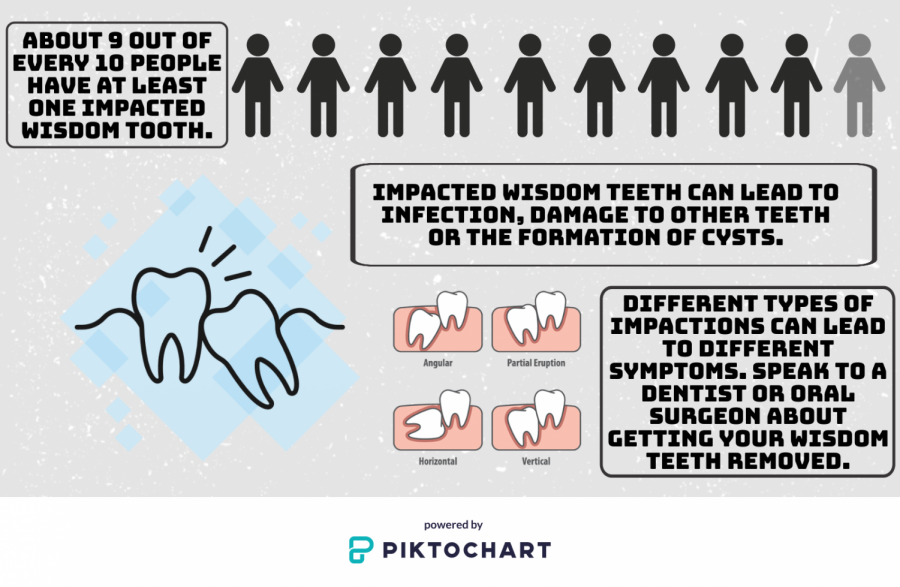Wisdom comes with age
Why do humans have wisdom teeth if they need to be removed?
When most teenagers are close to graduating from high school, they may start to feel some discomfort in the back of their mouth. This is a sign of their wisdom teeth starting to grow in. They get surgery to have the teeth removed and are back to feeling fine in a few days, if everything goes alright. However, not much thought is given to why we even need to have wisdom teeth removed or why humans have them in the first place.
Wisdom teeth are the third set of molars that are in the back of the mouth that form around the age of 7 to twelve and usually emerge later on. This usually happens around whenever someone is 17 to 21. This is where the name wisdom teeth comes from, as they come in at an older age than all other teeth. These four teeth make up the full set of 32 teeth, but a person can have anywhere from zero to four, and in some cases, even more than four.
[Insert quote here from Baylee Roberts]
Wisdom teeth are thought as the result of evolution. Ancient humans were thought to need these teeth to help them chew rough foods that were in their diet, such as leaves, roots, nuts and rough meat. Since modern food is softer than foods in ancient times, there is no need for wisdom teeth. As a result, many people have evolved to not have all of their wisdom teeth. It’s estimated that around 35% of the population do not have their wisdom teeth from birth. A large portion of the population — around 85% of the people who have wisdom teeth — need to have their wisdom teeth removed for an extensive amount of reasons.
“My brother and sister both got their wisdom teeth out at 19, and I have four wisdom teeth that I know that I’ll have to get out soon, but I’m not too afraid to get them out,” senior Steven Buerkle said.
Impaction is the most common reason for the removal of wisdom teeth. Whenever a tooth is trapped underneath a gum or there isn’t enough room for it to emerge, it is classified as impacted. Impacted teeth can bring a large variety of problems.
One of the most common problems with an impacted tooth is that it can cause pain and severe discomfort. Other reasons include that wisdom teeth can trap food and cause cavities to form. If bacteria were to enter the mouth and cause an infection, the teeth can have cysts form on them, which can lead to bone loss in the jaw.
While not everyone needs to have their wisdom teeth removed, it is still recommended that people who keep their wisdom teeth have them monitored to avoid future problems. People above the age of 35 are at a greater risk of having more complicated surgeries, along with longer healing times.
“I do not minimize the risks posed by retaining wisdom teeth. I have treated too many patients with severe neck infections related to decayed or impacted wisdom teeth necessitating emergency surgery in the hospital,” associate professor at the University of Texas Health Science Center Kamal Busaidy said.
Other creatures with wisdom teeth have been experimented on in order to find a way for the formation of wisdom teeth to be interrupted. To do this, they would need to use a laser or a chemical agent in order to stop the formation of the wisdom teeth. Early experiments have proven successful, but to see if it will work on humans, more work is being done.



